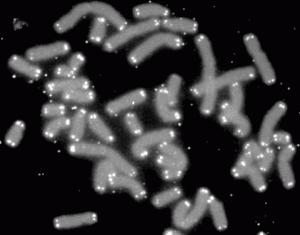Everyone gets older, but have you ever wondered why? Our bodies heal themselves, so why do organs eventually fail? The answer is fascinating. Our cells divide and make duplicates of themselves, but each time this occurs there is a section of the DNA that gets a little bit shorter. DNA replication starts at the middle and a bit of the ends don’t get copied. These sections are called telomeres. Telomeres are basically end caps to the information in our DNA. If this was important information for creating a new cell, then the duplicate cell would be incomplete. The telomere data is not necessary data for the creation of a new cell. However each time the DNA is duplicated the telomere region gets shorter and shorter.

Not only does the telomere data make sure that the data copied contains all of the information to make a new healthy cell, but it also makes sure that the DNA can’t accidentally fuse with other DNA in ways that would cause mutation. In fact, the body will destroy cells that have been created from DNA with depleted telomere regions because they are dangerous and have abnormalities that could reproduce like cancer. The reasons we have cancer cells is because sometimes mutations occur in ways that prevents the cells from being destroyed naturally.
Basically the shortening of the telomere region results in a built in self destruction clock and places an upper limit on the number of times cells can duplicate. This is referred to as the Hayflick Limit and is the reason why human life expectancy falls within a fairly narrow range. While some people may live to be more than 100, we don’t occasionally have outliers that are hitting 200 or 500 years.
The obvious question is if we can slow down the shortening process or not. The less telomeres shorten in each replication, the longer your body will continue to repair itself. Research seems to indicate that people with long life spans have genetic traits that slow the shortening of telomeres during cell duplication. There is an enzyme called telomerase that can slow down the telomere shortening and in some cases actually lengthen the telomere regions.
Long term intensive exercise over several decades has been shown to activate telomerase and slow down the shortening process. This is one of the reasons that people with healthy exercise-rich lifestyles often live longer–they simply don’t age as fast as their sedentary counterparts.
Scientists have looked at using telomerase to help extend the number of times a cell can divide. In theory, it might even be possible to reverse the Hayflick Limit by extending the telomere region of your DNA. Unfortunately this has an unwanted side effect. The body is constantly destroying cells that were created from DNA that has mutated. If we were to extend the telomere region of DNA it would benefit not only healthy cells but also cells formed from mutated DNA. So telomerase therapy might result in high rates of cancer. Some of the promising cancer research actually looking for ways to deactivate the telomerase enzyme in order to prevent cancer cells from multiplying.
It doesn’t appear that exercise will increase the risk of cancer through the activation of the telomerase enzyme. This is probably because it occurs in small enough quantities over decades and small amounts offer a very small benefit to healthy cells without benefiting cancerous mutations.
Ever since I first heard about telomeres way back in high school I have been fascinated by them. I have wondered for a long time if (or when) we will be able to conquer this frontier ;)
Well it sounds like we are getting closer to controlling them, but the whole cancer side effect thing is a bit problematic.
One thing that sort of blows all data out the window is people who live to very old ages 110+. I think it has less to do with dna or cells and more to do with attitude. Sure the body starts to go down hill after a certain age but that too has much to do with not using it in so many years. Look at today there are people in their 70’s and 80’s running marathons. When asked why these people live so long most will give hint to it having to do with their attitude. Living longer and having a younger body can perhaps be seen as two separate things. I believe it’s very possible for an 80 year old to have the body of a 25 year old, the mind too. The aging effect such as grey hair, wrinkles etc probably can’t be stopped lol but at least their body can look good from exercising. I firmly believe the only difference between an 80 year old and a 20 year old is AGE which is an illusion just like time is. People grow old because they stop living, caring and believing in themselves, that and they are forced to conform to society like a slave which in turn wreaks havoc on the mind.
Attitude is important, but there are definitely differences in the physical makeup of a 25 year old and an 80 year old.
The fact that a very small percentage of people live to be 110+ is very much in line with this research. Now if you had a few people living to be 500 while everyone else died at 80, you’d want to see what was different about them.